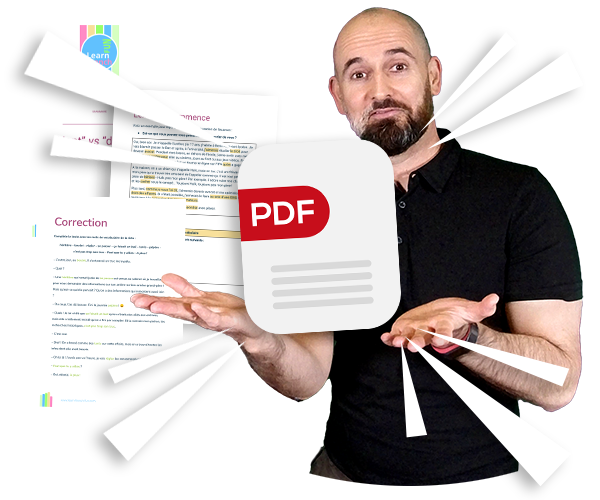I get this question a lot from my students: is it dont or duquel? The answer, as with most things in life, is that it depends of the sentence 😊
→ Dont is the relative pronoun that must be used for all verbs or verbal phrases building their complement with de.
Example: Parler de quelque chose : La chose dont je parle.
→ Duquel is a compound relative pronoun that is used behind a preposition + de (à cause de, à côté de, en raison de, près de…) to talk about an object.
⚠️ Attention: to talk about a person, we use de qui.
Examples:
- Être assis à côté du téléphone : Le téléphone à côté duquel on est assis.
- Être assis à côté de Christian : Christian, à côté de qui on est assis…
Let’s look at this in more detail and start at the beginning with a little reminder of what a relative pronoun is in French because it is very important if you intend to take the DELF B2.
What is a relative pronoun in French?
A French pronoun. We have already seen them in previous articles (tonic pronouns, direct complement pronouns, or How to use « en » and « y » pronoun in French?), it is a word that replaces one or several other words.
The relative pronoun does exactly the same thing. But not only that!
To simplify and to make it clear for everyone, we can say that the relative pronoun will allow to connect two sentences without repeating the same element that was in the two sentences!
Example of two sentences:
- Sentence 1: Nice est une belle ville
- Sentence 2: Nice est dans le sud de la France
I want to make one sentence, without repeating “Nice“, I use the relative pronoun.
Here, “Nice” is a subject, so I use the relative pronoun qui.
→ Nice, qui est une belle ville, est dans le sud de la France.
Do you like learning French with videos?
Receive our free video newsletter every Friday in your e-mail box. You will get 3 “Tips & Tricks” on grammar, vocabulary, phonetics or French culture.
👉👉 Sign up now!
Which French relative pronoun to replace…
So you know that when we want to replace:
1) the subject → we use qui
- Nice, qui est une belle ville, est dans le sud de la France.
2) When you want to replace the COD (Direct object complement) → you use que
- Le film que je regarde est très intéressant..
3) When it’s the place or time → we use où
- Le jour où je suis né, il pleuvait. (TIME)
- Nice est la ville où je suis né. (PLACE)
4) a group of words preceded by a preposition → lequel is used or its derivatives laquelle (f), lesquels (pl), lesquelles (f – pl)
- C’est la voiture avec laquelle j’ai fait le tour du monde..
What is DONT used for?
Dont is a relative pronoun that students really love… Like the subjunctive, there are themes like this that students love so much! 😂
A moment ago, I told you that a group of words preceded by a preposition is replaced by the relative pronoun lequel (or its feminine or plural derivatives).
Yes… so… Not all prepositions! When it’s the preposition de, you use the relative pronoun dont.
That’s why it’s important to know the verbs that are built with “de”!
Like: parler d’une chose. If I want to replace “une chose” with the relative pronoun, I have to use dont.
→ Une chose dont je parle.
Some French verbs with the preposition “de”
Here is a list of French verbs and expressions that are constructed with the preposition de:
- Parler de (talk about)
- avoir envie de (want to)
- avoir besoin de (need to)
- avoir peur de (to be afraid of)
- se douter de (to be suspicious of)
- se méfier de (to be wary of)
- se servir de (to use)
- se souvenir de (remember to)
- être + adjectif + de (être fier de, être content de, être fou de…) – (to be proud of, to be happy with, to be crazy about…)
If you use any of these verbs or constructions in a sentence with a relative pronoun, you must use dont!
💡If you want a larger list of verbs or expressions that are built with dont or duquel, download the Little Bonus PDF! You’ll find:
- a larger list of verbs and expressions that are used with dont and duquel
- examples of use
- and exercises with the correction

PDF Bonus
We have prepared a free PDF to help you understand and master the difference between DONT and DUQUEL in French. 👉 Download it for free
At the end, you will have exercises to practice with the correction. 👍
Quickly download the Little Bonus PDF.
Where is DUQUEL used?
Now let’s look at the case of the relative pronoun duquel.
1st thing, it is simply the contraction of the preposition de and the relative pronoun lequel.
You know that : “de le” does not exist ! We say : “du“. Well, this rule also works with the relative pronoun lequel.
The preposition de + lequel = duquel.
You may be thinking that we just saw that with the preposition de, we used the relative pronoun dont! So, how is this possible?
For duquel, you need one more preposition that precedes!
For example: à côté de (next to)
In “à côté de“, we have:
- the preposition: à côté
- and the preposition: de
As there is “à côté“, we can’t use dont, but we have a preposition, and we have seen that with a preposition, we use lequel.
And… since there’s “de”, we have to do the contraction. → DUQUEL.
With an example, it will be clearer:
- Je suis assis à côté de la fenêtre.
- La fenêtre est ouverte.
I want to make a single sentence with these two sentences.
I want to replace “la fenêtre” in the first sentence.
I notice that just before “la fenêtre”, there is “à côté de“.
So this gives:
→ La fenêtre à côté de laquelle je suis assis, est ouverte !
– But “de laquelle” is not duquel!!
– Of course it is! It’s just the feminine. Don’t forget, I’m replacing “la fenêtre“.
→ Le tableau à côté duquel je suis assis, est un Picasso.
Here, I replaced “le tableau“
Chart to remind you
What is being replaced is:
Masculine singular? → duquel Feminine singular ? → de laquelle (2 words!) Masculine plural? → desquels Feminine plural? → desquelles
⚠️ An important note, when you replace a person, you don’t use duquel or de laquelle, but de qui.
→ La personne à côté de qui je suis assis, est allemande.
Are DONT and DUQUEL interchangeable?
If you have read what we have just said, then you know that you can’t interchange dont and duquel. Each is used in a specific case.
Let’s do two little exercises together to practice.
1) Look at this sentence: Le film _______ je te parle, a eu 2 Oscars.
If we break down this single sentence into two sentences, we get:
- Je te parle du film.
- Le film a eu 2 Oscars.
We want to replace “le film” in the first sentence.
We see that there is the preposition “de“: parler de
Is there another preposition in front of it? No.
So, we use dont.
→ Le film dont je te parle, a eu 2 Oscars.
2) Another sentence: Je t’attendrai au café en face ________ je travaille.
Same procedure, we break it down into 2 sentences:
- Je t’attendrai au café.
- Je travaille en face du café.
We want to replace “café” in the 2nd sentence.
we see the preposition “de“.
Is there another preposition in front? Yes → “en face”
So we use duquel or its derivatives.
⚠️ CAUTION, we’ll ask ourselves 2 more questions:
- Is “café” a person? No. If it was a person, we would have used “de qui“.
- What is the gender and number of the word “café“? Masculine? Feminine? Singular? Plural? It is masculine singular. We look in the chart from earlier and so we use duquel.
→ Je t’attendrai au café en face duquel je travaille.
Easy, right?
✔️ French QUIZ
DONT versus DUQUEL
Before leaving, let’s take this little quiz together to see if you understand 😀
Results
#1. Le livre _____ je t'ai parlé hier est vraiment intéressant.
#2. La maison de campagne, à côté _____ il y avait un très grand champ, a été vendue il y a quelques années.
#3. La femme _____ la voiture a été volée hier soir a appelé la police.
#4. La personne près _____ j'étais assise dans le métro est très célèbre.
#5. C'est le sac au fond _____ j'ai retrouvé mes clés.
📌 Free PDF Bonus:
Do you want to do more exercises on DONT & DUQUEL in French and have the correction? Have a summary sheet of the lesson?
Then download the free Bonus PDF!
Okay, that’s a logic you have to take…
In writing, you’ll see that you can do it more easily because you have time to think about the procedure. You have time to reason like a computer and analyze your sentence precisely to choose the right pronoun.
When you speak, it’s true that you don’t have much time before you say your sentence, so it’s a bit more difficult. But you can practice 👍
In the Little Bonus PDF, you have exercises with the correction 💪😀
And above all, speak French! The more you speak French, the more you will be able to make sentences without mistakes.
Ciao, see you soon 😀
Articles that might interest you:
- The Imperative in French: How to Conjugate Verbs in Imperative? When do You Have to Use the Imperative?
- The 10 Irregular Verbs in the French Subjunctive Mood
- Depuis, pendant, en, il y a, dans
- All the secrets of the French gerund!
- French verb moods
- How to use the tonic pronouns in French?
- How to use “en” and “y” pronoun in French?
- Difference between DONT and DUQUEL in French
- 10 common French verbs conjugated in the present tense. Beware of traps!
- The Direct Object Complement in French (C.O.D.) and direct complement pronouns (le, la, les…)







2 thoughts on “Difference between DONT and DUQUEL in French”
Comments are closed.